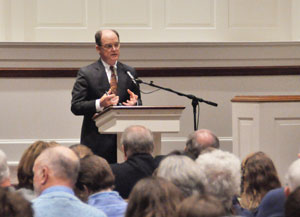Promise and challenge of faithful presence
 James Davison Hunter addressed a packed Hostetter Chapel Oct. 26 on what it means to be a Christian in our world today. Hunter, a distinguished professor of religion, culture and social theory at University of Virginia, shared his argument from one of his most recently published books, “To Change the World: The Irony, Tragedy and Possibility of Christianity in the Late Modern World.” Hunter’s book inspired the theme of this year’s college lecture series, “To Change the World,” that explores the promise and challenge of being a faithful presence in contemporary society.
James Davison Hunter addressed a packed Hostetter Chapel Oct. 26 on what it means to be a Christian in our world today. Hunter, a distinguished professor of religion, culture and social theory at University of Virginia, shared his argument from one of his most recently published books, “To Change the World: The Irony, Tragedy and Possibility of Christianity in the Late Modern World.” Hunter’s book inspired the theme of this year’s college lecture series, “To Change the World,” that explores the promise and challenge of being a faithful presence in contemporary society.
Hunter began by posing his central questions: “How can Christians be faithful in the world around them? How do we guide youth who want to give up their lives to change the world?”
Hunter outlined three paradigms that Christians use to culturally engage our world: “defensive against,” “relevance to” and “purity from.” He advocates that each model misconstrues the fundamental challenges that Christians face today. “Christians don’t know how to deal with pluralism,” Hunter said. “They see difference as danger or darkness, or they don’t see it all.”
According to Hunter, none of the current paradigms correctly address difference and disillusion, the two concepts that challenge Christian faith to its core. The struggle to overcome difference is a struggle to answer the question of how to be authentically Christian in a pluralistic world. Disillusion then comes into play when words are interpreted differently by each individual or denomination.
“If we look to Scripture, it offers a different approach to the world and word,” Hunter said. “God said and it was. There is a trust between word spoken and the world as it came to be.” This is seen throughout the Bible—in creation, incarnation and healing.
“This is a demonstration of God’s love as the word and the world come together,” Hunter explained. “Not because words describe the world, but because God’s word is always enacted.”
In the reality of that basic truth is Hunter’s answer to the central question of how to culturally engage our world as Christians. He proposes a new paradigm, “faithful presence within,” that is based off of God’s demonstration of his love for us.
“God pursues us, identifies with us and offers us life through sacrificial love,” Hunter said, suggesting that Christians should model their interactions with the world after God’s interactions with us.
First, Christians should be fully present to each other, imitating our creator by pursuing one another. “We were strangers to Christ, and our treatment of strangers is a measure of righteousness,” Hunter said. “However different we are, difference does not represent darkness or danger.”
Next, Hunter suggested that God intends for us to be fully present to our tasks. He referenced Colossians 3 where it is written, “Whatever you do, work at it with all your heart.” Hunter believes that a faithful presence in our modern world involves the pursuit of excellence in all of our tasks.
Finally, Hunter encouraged Christians to be fully present to the fears of social change. “As Christians, we need to seek the welfare of all, not only the house of God,” he said. “When all members of the body of God are engaged, the word becomes flesh! Our faith is then authentic because it is enacted.”
Hunter concluded that this is his vision for the entire church even in its diversity: “to enact the shalom of God through faithful presence.”
“Will that change the world?” Hunter asked. “Maybe… but it’s impossible to say. Christians won’t make the world entirely new, but we could possibly make it a little better.”
Story by Mary-Grace MacNeil `13.





November 1st, 2011 at 10:04 pm
Good story on Mr.Hunter’s explanation on what it means to be a christian in this type of society. i enjoyed it. Thanks 🙂